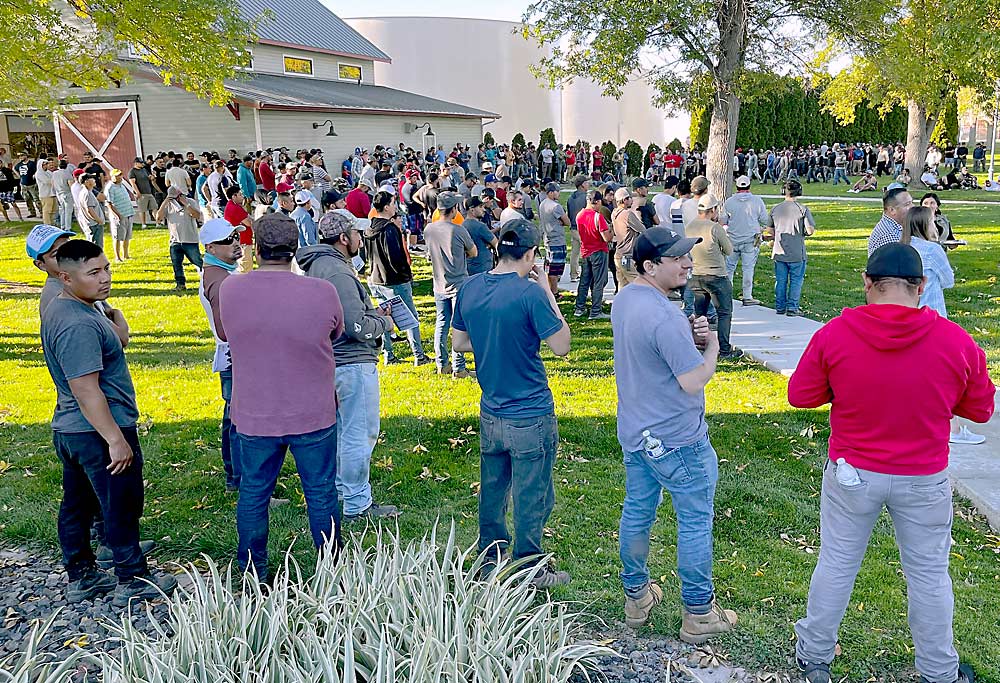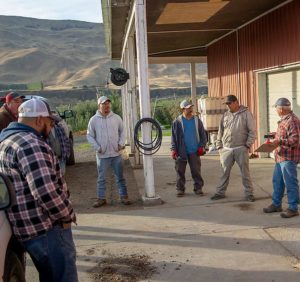
Editor’s note: Two nonprofit groups are inviting Washington farmworkers to speak about agricultural overtime pay requirements affecting their paychecks at a Jan. 25 rally at the state capitol in Olympia. For details, see our update online at: goodfruit.com/washington-farmworkers-to-rally-about-overtime-in-olympia.
The tree fruit industry has joined other Washington agricultural groups to ask state lawmakers — again — for a break on overtime.
Given the Legislature’s Democratic majority, the odds are against them.
“It’s a long shot,” said state Sen. Curtis King, a Yakima Republican sponsoring a bill to temporarily raise the overtime threshold during the busiest weeks on Washington’s farms.
They may have a better chance this year, though, after some farmworkers complained publicly at Central Washington rallies and said they have been earning less money since 2020, when the Legislature passed a mandate that required time-and-a-half pay for farm overtime.
King and ag employer groups are seeking — for the second straight year — a seasonality clause that would allow farmers to designate a peak work period, most likely harvest, with a higher threshold at straight pay.
Up until the previous decade, the whole country had exempted agriculture from the 1938 U.S. Fair Labor Standards Act, which codified the 40-hour workweek and required 1.5 times pay for overtime. Starting in 2016 with California, individual states — Washington, Oregon, New York and Colorado among them — have since dropped that ag exemption.
Washington’s original negotiations included a seasonality clause, but that was dropped in the rush to establish a law that did not expose growers to retroactive claims, said Jon DeVaney, president of the Washington State Tree Fruit Association.
“This is not a change in the deal,” DeVaney told growers at the group’s annual meeting in December.
In 2021, the state began phasing in the threshold. It fell to 40 hours on Jan. 1 this year, but the industry started noticing the effects the past two years as growers reconsidered which blocks were worth pruning, thinning and harvesting, said Mike Gempler, executive director of the Washington Growers League in Yakima. “It already is changing what you pick and what you grow,” he said.
Last year, King’s bill, which would have allowed up to 50 hours for straight pay during 12 weeks, died in the Senate Labor and Commerce Committee. King, the committee’s ranking Republican, wants another hearing. Sen. Mark Mullet, an Issaquah Democrat, co-sponsored the bill.
Various approaches in other states aim to reduce the burden of new overtime rules on farmers. Colorado has a seasonality clause to its ag overtime mandate, while New York and Oregon allow farm employers to use some of their overtime wages as tax credits.
In Washington, groups such as Familias Unidas por la Justicia and Columbia Legal Services have advocated keeping overtime pay requirements in place, with no seasonal changes, as a matter of social justice.
Supporters of the seasonality clause in Washington, however, say this year may be different.
Over the summer, at some organized gatherings, workers publicly discussed the effects of the overtime law on their paychecks.

Some said their employers had been granting them overtime pay and were happy with the changes. But most workers criticized the effect of the overtime law, claiming they are bringing home less net pay because their employers don’t offer them as many hours. Some said they need second jobs to make up the difference.
One of those speakers was Yhonathan Riquelme, a ranch manager for Columbia Farm Services based in Quincy, who spoke to Good Fruit Grower in December.
Riquelme, paid hourly, used to build his family’s budget around working between 60 and 70 hours per week during busy times on the farm. The cutback in hours has prompted his family to shop more carefully for food, clothing and school items. He is now seeking a second job, while he and his wife are reconsidering their annual vacation to California. He has one child; some of his team members have four or five, he said.
Meanwhile, as a manager, he understands his company can’t afford overtime for anything except emergencies during frost control or harvest.
The proposed seasonality clause would strike a compromise, Riquelme said.
“We need to find an equilibrium,” he said. “We need to find how the industry can keep growing, but growing together.”
Riquelme also worries farmworkers may not fully understand the changes. They are surprised when employers limit their hours.
“It’s like a bucket of cold water,” Riquelme said. “There needs to be more information for farmworkers. People still don’t understand, it’s not real clear.”
Maia Espinoza said she hopes more Democrats listen to farmworkers this session. She is the executive director and founder of the Lacey-based Center for Latino Leadership. The group helped organize five Central Washington forums like the one Riquelme spoke at. Republican state Rep. Alex Ybarra of Quincy, a supporter of King’s seasonality clause, is a board member.
In February 2023, after some workers testified in favor of seasonality at an Olympia hearing, Democratic senators said the workers might be mistaking their employers’ inability to afford overtime with overtime somehow being against the law now.
Espinoza called that “condescending.” Even if workers don’t know the whole history of the law, they certainly understand how it impacts their lives. “Poor people are not stupid people,” she said.
University of California research backs up the decreased earnings argument.
California began phasing in an ag overtime mandate in 2019. In the two years that followed, the share of California farm employees working 56–60 hours per week fell by half, while the segment working 46–50 hours — just below the overtime threshold at the time — rose by one-third, according to research by economist Alexandra Hill of UC Berkeley. Likewise, the share of workers earning $600–$800 per week fell by one-third, while the share earning $400–$600 went up by one-third.
This shows that employers on balance did what they said they would do, Hill said — reduce their workers’ hours rather than let them accrue overtime.
Hill based her research on results of the National Agricultural Workers Survey, a random-sample wage, health and demographic survey of crop workers published every two years by the U.S. Department of Labor.
She plans to continue her studies when the next version comes out in the coming months, but her sneak peeks at data show the trend is following the same path. She also plans to break down the impacts by demographics, type of work and crop categories.
“I don’t think there’s a one-size-fits-all solution,” Hill said.
—by Ross Courtney
Orchard manager calls for a middle ground on overtime
The first thing we must understand is that agriculture is different from other industries. It is not the kind of business that we can close down today and start up again next week without taking large risks. Orchards must be supervised and managed every single day.
This new overtime law changes the economics of the industry, affecting both employer and employees. The impact in the valleys of Washington is huge, considering that companies feel they must regulate the number of hours they give each worker, limiting family incomes. In the case of farmworkers, we are losing about 40 percent of our income.
In concrete figures, a general laborer will lose between $1,000 and $1,500 every month. This translates into a huge change in the quality of life of each worker and their families. It limits our ability to keep up with monthly payments and take care of our children. It forces us to rearrange our priorities.
A large number of agricultural workers are coming to Washington with the H-2A program, and for all of them, the dream of making enough money to fulfill their goals and plans will end. They just want a better quality of life for their families, a house to live in, to enjoy good food and one day maybe take a long-postponed vacation.
On the other hand, for a local agricultural worker already living in the Washington area, being limited to only a 40-hour workweek will soon become unsustainable. If we hope to make it through the week or to the end of the month, many of us will be forced to look for additional income options or find a second job. The country’s struggling economy and recent inflation has increased the cost of living, and money has become tighter and tighter.
We all must take time with our families to look for lower food prices and cheaper clothing. And we don’t want to get sick, which is extremely expensive. These days we must choose between making payments on a debt or putting food on the table or having warm clothes or simply being able to go out now and then.
I do not believe that the solution is to have limitless work hours or return to the 80–90 hours a week of previous years. This also adversely affects the quality of life of each of us and our families. We don’t want to wind up living to work and never having a moment to enjoy the fruits of our labor.
We are in an era of constant change, where the demands for productive efficiency, technology and well-being sound louder every day.
Keeping all this in mind, I want us to search for a middle ground that will help maintain agriculture in constant growth and where both employer and employee can also continue to grow.
It is important to foster worker engagement and provide information to the workers, so we may reflect on how it will affect our lives.
Personally, my family is small so we can adapt quickly to changes. But the big concern is for the larger families. Even a small financial change forced on them can generate great instability.
—byYhonathan Riquelme
Yhonathan Riquelme manages a Zillah, Washington, orchard for Columbia Farm Services. His column was translated from Spanish by Good Fruit Grower’s Jean Dibble. You can read his original column in Spanish at: goodfruit.com/es/en-busca-de-un-alivio-al-costo-de-las-normas-sobre-horas-extras-agricolas.







Leave A Comment